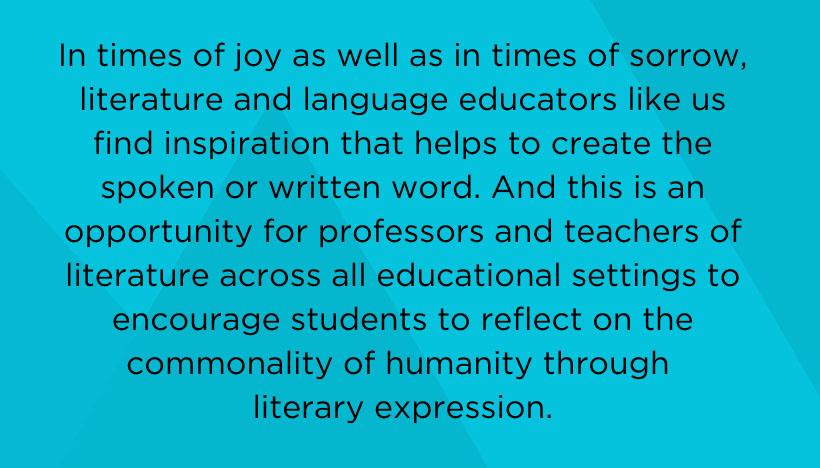From the NCTE Standing Committee on Global Citizenship
This post was written by NCTE member Heerak Kim, a member of the NCTE Standing Committee on Global Citizenship.
Who would have thought this possible? The whole world shares an identity and experience that are common at many levels. Fears, hopes, pain, even death of loved ones. COVID-19, otherwise known as coronavirus, has united the world in ways that nothing else has done ever before, at least in modern memory. Whether wealthy or poor, educated or not, speaking English, Korean, or other languages, people of the world have been united by COVID-19 in global citizenship in ways no positive efforts have accomplished. People and nations in the world feel a sense of camaraderie, even a shared identity in the common struggle, as individuals and their communities fight to survive against COVID-19.
COVID-19 started in December 2019 in Wuhan, the capital of China’s Hubei Province, and most of the world did not think much of it at first. Many people thought that it would end relatively harmlessly, like SARS or H1N1. Even Ebola, the most recent outbreak in 2014–2016, seemed to end with a fizzle without much life lost, at least in America or Europe.
But this time, it is different. COVID-19 started to spread in other countries even more virulently as it had in China. Italy saw COVID-19 inflection followed by thousands of deaths. Spain soon followed. Then, Germany and France. And now, England’s death rate due to COVID-19 is rising exponentially.
With President Donald Trump closing off China and Europe, some in the United States thought Americans were safe. But soon, this assumption proved to be wrong. Human beings in the United States proved just as vulnerable to COVID-19 as human beings in China and human beings in Europe. Now, human beings in Africa, South America, Australia, the Middle East, and elsewhere are experiencing the common, shared human experience of the global COVID-19 pandemic. It is now April, 2020, only a few months since the start of COVID-19 in China, and the whole world is engulfed in the global pandemic.
The world shares tears as COVID-19 takes the lives of loved ones. People of all races and ethnicities share fears about being infected with COVID-19 and then possibly passing away from this life. Leaders of different nations in the world, from the wealthiest to the poorest, exhibit the same strain on their faces, whatever their race or ethnicity, as they try to reassure their citizens that “We shall overcome!”
This is indeed a form of global citizenship, albeit shared through negative circumstances. We cannot deny the veracity, but also validity, of negatively contrived global citizenship. Negative, in terms of perception and pain, global citizenship unifies— perhaps more strongly than some of the positive forms of global citizenship many educators and idealists have tried to forge for decades or even centuries.
Fear is the great equalizer, a force of equity that brings men and women of different status, experience, national origin, language, and culture to the same basic commonality of desire to survive. Ironically then, the global pandemic COVID-19 is the greatest practitioner of equity in the world. Everyone participates in global citizenship through COVID-19.
In this regard, educators of literature and language can invite conversations about global citizenship wrought by COVID-19 through literature and shared experience in prose and poetry. I will start off our participation in clobal citizenship through COVID-19 with an original poem:
COVID-19
Coronavirus, a curse of doom or a gift of unity?
One in suffering, pain, and fear are we all in the world
Voiding differences with which we cannot identify across national lines.
I and You, we share this experience of fear of infection.
Death of loved ones, famous people, strangers, they all touch us in some way.
1 to 1, we fear to speak now, and all are alone!
9 to 5 jobs have almost all ceased, and we are forced to reflect on common humanity.
In times of joy as well as in times of sorrow, literature and language educators like us find inspiration that helps to create the spoken or written word. And this is an opportunity for professors and teachers of literature across all educational settings to encourage students to reflect on the commonality of humanity through literary expression.
What is equity in the age of COVID-19? Why not encourage your eleventh-grade English class, conducted via Zoom, to write a prose essay about it and share it via Zoom? COVID-19 is affecting these students, and the literary soul in each and every one of your students longs to express themselves; it is your role to guide them to their literary expression.
Catharsis awaits for your students, whose fears, hopes, and dreams can be put to paper or to their electronic computer screen. Your students can share their creation and feel a sense of accomplishment, worth, and empowerment. Yes, you can empower your students through essay exercises that are shared online.
Why not have your college English literature class students compare and contrast The Plague by Albert Camus with their current perception or experience with COVID-19. Your students do not have to feel powerless and become dominated by COVID-19, and neither should you! Take charge of your class, your life as an educator of literature, and use this opportunity to lead your students to empowerment through literary reflection and critical thinking.
Mechanics of poetry can be taught to your elementary and middle school students, and they can be encouraged to express themselves in free form or in the style of e. e. cummings or Robert Frost via poetry about COVID-19, in literary imitation or in original composition. Your students can be guided to self-empowerment and self-efficacy. And this can be their personal salvation as they face an uncertain future and present fears that they might not yet fully understand.
In the age of global pandemic COVID-19, educators of literature and language can do their part to bring a ray of sunshine to the world and, more importantly, to the lives of students, who may feel that they are in a tunnel without a flashlight or a candle. You can light their candle with your match, helping them to find their way out of the tunnel to the bright sunshine and the beautiful world outside with lush trees, singing birds, and a zephyr that whispers to them that “All will be okay!”

Heerak Kim is currently an Ed.D. student in leadership at the American College of Education. His research interests include global citizenship as applied to African-American communities, immigrant populations, and special education students.
The Standing Committee on Global Citizenship works to identify and address issues of broad concern to NCTE members interested in promoting global citizenship and connections across global contexts within the Council and within members’ teaching contexts.

